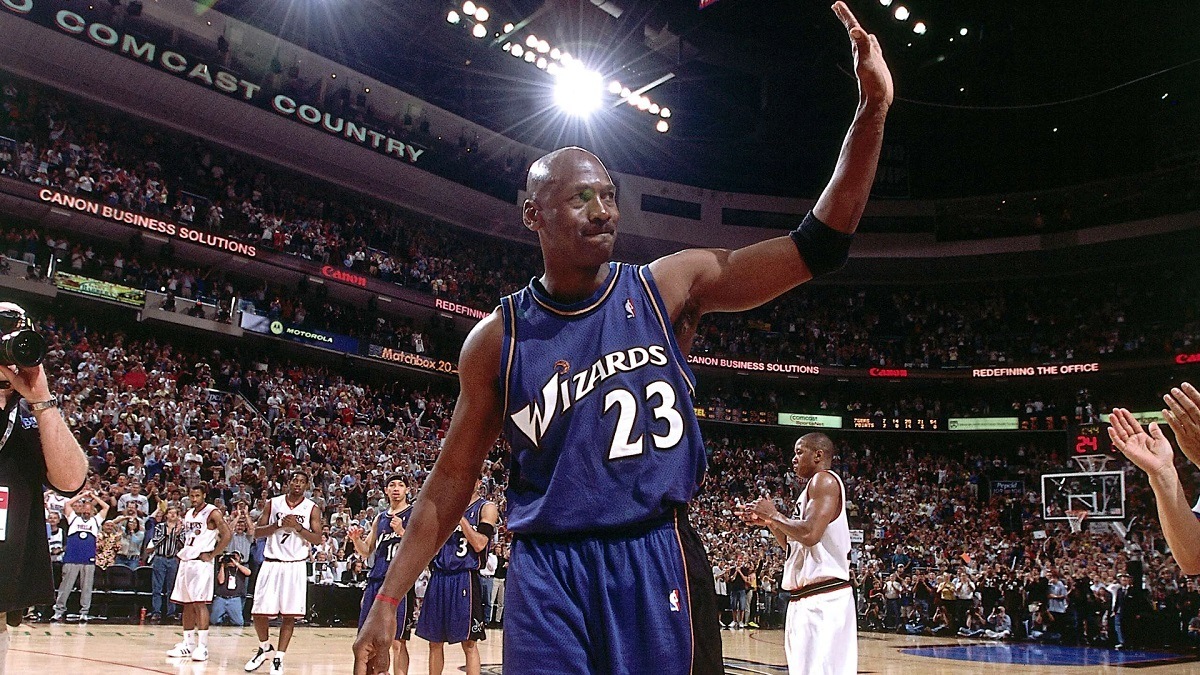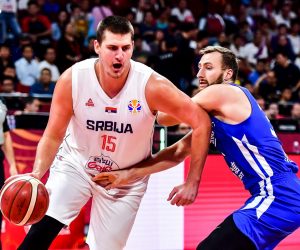After a three-year layoff, Michael Jordan laced up his sneakers and unretired for the second time in his storied NBA career when he joined the Washington Wizards for the 2001-02 and 2002-03 seasons.

While the ESPN documentary series “The Last Dance” covered Jordan’s final season with the Chicago Bulls, his third stint as a pro basketball player is often overlooked.
At age 38, Jordan joined the Washington Wizards. The so-called “Black Jesus” still had some gas left in the tank as he dazzled fans. However, Jordan was definitely in the twilight of his career. His body caught up to him and Jordan played only 60 games in his first season back due to injuries.
Michael Jordan – Washington Wizards Averages
2001-02: 22.9 points, 5.7 rebounds, 5.2 assists
2002-03: 20.2 points, 6.1 rebounds, 3.8 assists
In his second year with the Wizards and in his final season (for real), Jordan appeared in all 82 games, but came off the bench in a few instances.
Jordan still averaged 20-plus points a game, but he was no longer a dominant force like he was before he retired from the Chicago Bulls after winning six championships in eight seasons.
In every full season with the Bulls, Jordan never averaged below 28 points. He put up 28.2 points during his rookie season in 1984-85.
MJ’s First Retirement
Jordan first retired in 1993 after the murder of his father. He had just completed a long season and had won his third consecutive NBA championship. The previous summer, he went to Barcelona to win a gold medal at the 1992 Summer Olympics. In short, MJ was burned out. He lost focus due to the loss of his father and stepped away from the game.
Jordan decided to pursue his life-long passion for baseball. He never played in college and focused on basketball solely while at North Carolina.
Jordan signed a deal with the White Sox minor league team. The Bulls owner, Jerry Reinsdorf, also owned the White Sox. Jordan toiled with the Durham Bulls in AA ball — a level from which he never advanced. He batted .202 and, depending on who you talk to, that number seems paltry or overly impressive. Jordan smacked three home runs in the minors.
During the 1994-95 MLB strike, Jordan refused to cross the picket lines. Without a minor league team to report to for 1995 spring training, he went back to Chicago. He practiced with the Bulls and within a couple of weeks, he returned to his old team wearing #45.
“I’m back!” was all anyone in Chicago needed to hear.
A winded Jordan didn’t have his body in basketball shape for the remainder of the season and postseason. He vowed to regain his old form. As a result, he won three more straight titles for a second three-peat. With six titles won in eight years, Jordan retired for a second time.
Return to the Wiz
Jordan gave up two peak seasons in his early 30s due to his first retirement. He also passed up potential golden years during the three-year layoff at the end of the 1990s.
Who knows what he could have accomplished with five more seasons in peak form?
A hungry Jordan returned to the hardwood in 2001. He knew it would be his last chance before he turned 40 and his body completely broke down while having to defend players half his age. Jordan vowed to donate his salary to the families of 9/11 victims.
Jordan blew out his knee and his season ended prematurely after 60 games. In his short stint back, he led the Wizards in scoring with 22.9 points per game. It was definitely a notch down from his 30-plus glory days. Then again, the Wizards also lacked a supporting cast like the one the Bulls built during their 1990s dynasty.
In one of his greatest performances, Jordan dropped 51 points in a game in December 2001.
Jordan turned 40 during his final season with the Wizards. He appeared in all 82 games, but started in just 67 of them. He averaged 20.2 points per game — the lowest full-season total in his storied career.
Jordan retired at the end of the season. He racked up 14 All-Star appearances and played 1,072 games. He averaged 30.1 points over his career with 6.2 points and 5.3 assists per game. Jordan finished with 32,292 points. He’s currently ranked #5 all-time behind Kareem Abdul-Jabbar, Karl Malone, LeBron James, and Kobe Bryant.











